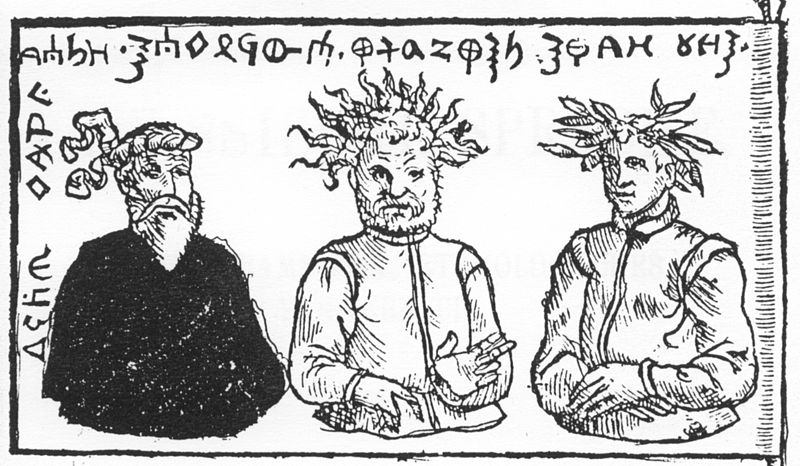Peckols on:
[Wikipedia]
[Google]
[Amazon]
 Peckols and Patollo (known under a multitude of different names) were gods in the pagan
Peckols and Patollo (known under a multitude of different names) were gods in the pagan
 Peckols and Patollo (known under a multitude of different names) were gods in the pagan
Peckols and Patollo (known under a multitude of different names) were gods in the pagan Prussian mythology
The Prussian mythology was a polytheistic religion of the Old Prussians, indigenous peoples of Prussia before the Prussian Crusade waged by the Teutonic Knights. It was closely related to other Baltic faiths, the Lithuanian and Latvian mythol ...
who were worshiped by the Old Prussians
Old Prussians, Baltic Prussians or simply Prussians ( Old Prussian: ''prūsai''; german: Pruzzen or ''Prußen''; la, Pruteni; lv, prūši; lt, prūsai; pl, Prusowie; csb, Prësowié) were an indigenous tribe among the Baltic peoples that ...
. Most researchers believe that, despite varying names, Peckols and Patollo were probably the same god in charge of the underworld and the dead. It is usually described as an angry, evil spirit similar to the Lithuanian Velnias
Veles,; Serbo-Croatian, Czech, Slovak, Russian, Slovenian: ''Veles''; Ruthenian and Old Church Slavonic: Велесъ; be, Вялес, translit=Vialies also known as Volos, is a major god of earth, waters, livestock, and the underworld ...
.
''Patollu'' was first mentioned in 1418 by Bishop of Warmia
This is a list of Bishops and Prince-Bishops of the Diocese of Warmia ( pl, link=no, Diecezja warmińska, la, link=no, Dioecesis Varmiensis, german: link=no, Bistum Ermland), which was elevated to the Archdiocese of Warmia in 1992.
The Bisho ...
in a letter to the Pope. Chronicler Simon Grunau Simon Grunau (c. 1470 – c. 1530) was the author of ''Preussische Chronik'',Full title: ''Cronika und beschreibung allerlüstlichenn, nützlichsten und waaren historien des namkundigenn landes zu Prewssen'' or ''Chronicle and description of the mos ...
(1529) provided more vivid but dubious details about ''Patollo''. According to Grunau, ''Patollo'' was one of the three gods portrayed on the flag and coat of arms of King Widewuto
Widewuto (also ''Viduutus'', ''Vidvutus'', ''Witowudi'', ''Waidewut'', ''Vaidevutis'') was a legendary king of the pagan Prussians who ruled along with his elder brother, the high priest (''Kriwe-Kriwajto'') Bruteno in the 6th century AD. They are ...
and worshiped in the temple of Rickoyoto. He was portrayed as an old man with a white beard and a white headdress similar to a turban. He was a frightening and ruthless god of the dead who would haunt and taunt the living if they disobeyed their pagan priests or buried the dead without proper sacrifices to the gods. Many other early modern writers, including Alexander Guagnini
Alexander Guagnini ( pl, Alexander Gwagnin, it, Alessandro Guagnini dei Rizzoni; 1538 in Verona, Republic of Venice – 1614 in Kraków, Polish–Lithuanian Commonwealth) was a Venetian-born Polish writer, military officer, chronicler and his ...
and Lucas David
Lucas (or Lukas) David (1503 - April 1583) was a German historian, who from ca. 1550 on compiled extensive volumes on Prussian history.
Life
David was born in Allenstein (Olsztyn), Royal Prussia, Poland, to Gerhard Dönhoff. He studied at the ...
, followed Grunau in their descriptions of ''Patollo''.
The ''Sudovian Book
The so-called ''Sudovian Book'' (german: Sudauer Büchlein, lt, Sūduvių knygelė) was an anonymous work about the customs, religion, and daily life of the Old Prussians from Sambia. The manuscript was written in German in the 16th century. The ...
'' (1520s), mentioned two beings – ''Peckols'', the god of hell and darkness, and ''Pockols'', the airborne spirit or devil. The same pair is also found in the church decrees of 1530 (''Constitutiones Synodales''). There, ''Pecols'' was identified with the Roman god
Roman mythology is the body of myths of ancient Rome as represented in the literature and visual arts of the Romans. One of a wide variety of genres of Roman folklore, ''Roman mythology'' may also refer to the modern study of these representat ...
of the underworld, Pluto
Pluto (minor-planet designation: 134340 Pluto) is a dwarf planet in the Kuiper belt, a ring of bodies beyond the orbit of Neptune. It is the ninth-largest and tenth-most-massive known object to directly orbit the Sun. It is the largest ...
and ''Pocols'' with the Greek
Greek may refer to:
Greece
Anything of, from, or related to Greece, a country in Southern Europe:
*Greeks, an ethnic group.
*Greek language, a branch of the Indo-European language family.
**Proto-Greek language, the assumed last common ancestor ...
deities of anger, the Furies
The Erinyes ( ; sing. Erinys ; grc, Ἐρινύες, pl. of ), also known as the Furies, and the Eumenides, were female chthonic deities of vengeance in ancient Greek religion and mythology. A formulaic oath in the ''Iliad'' invokes the ...
. Jan Sandecki Malecki followed the Sudovian Book and wrote about ''Pocclum'' and ''Poccollum''. Jonas Bretkūnas, Caspar Hennenberger, and later authors attempted to reconcile the accounts provided by Grunau and the Sudovian Book. In the 17th century Christoph Hartknoch and Matthäus Prätorius testified that people still believed in ''Picolli'' and ''Pykullis''.
References
{{reflist, refs= {{cite book, title=Lietuvių ir prūsų dievai, deivės, dvasios: nuo apeigos iki prietaro , first=Rimantas , last=Balsys , publisher= Klaipėdos universitetas , year=2010 , isbn=978-9955-18-462-1 , pages=223–231, language=lt Death gods Prussian gods Lithuanian gods Baltic gods Underworld gods